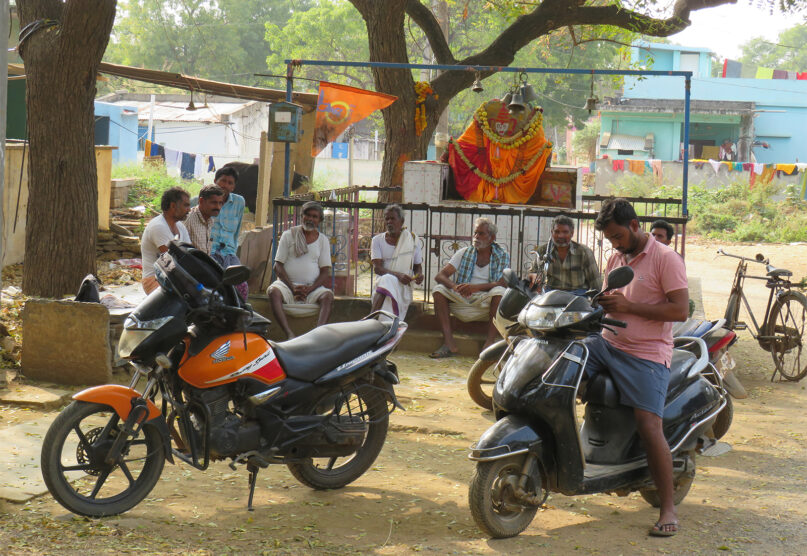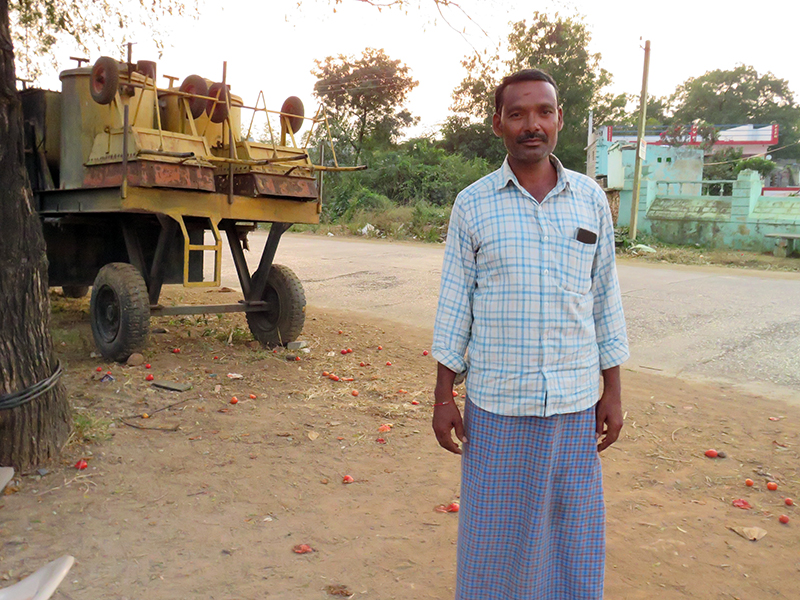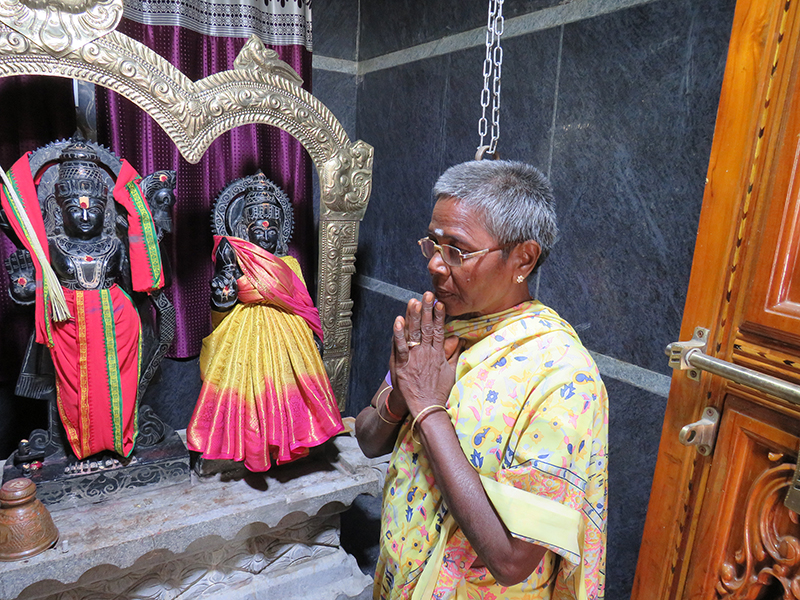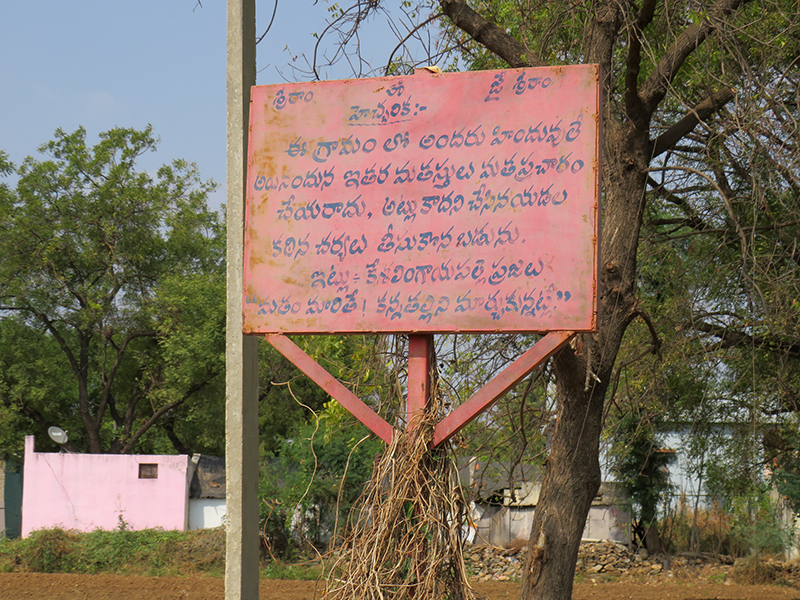A village of just 250 families put up a clear warning to non-Hindus wanting to enter.

KADAPA, India (RNS) — A decade ago the residents of Kesalingayapalli, a village in the south Indian state of Andhra Pradesh, succeeded in building a temple to the Hindu god Ram, modeling their home as a place “rooted in Indian culture and tradition.”
Three years later, during the festival commemorating Ram’s birth, Bandi Venkatramana, a local farmer, erected an urgent red-and-white sign, known here as a saffron board, at the entrance to the quiet village.
It read: “In this village everyone is a Hindu, hence people of other religions can’t propagate their faith here. If someone violates this warning, stern action will be taken against them. If you convert to a different religion, it’s akin to changing your mother.”
Venkatramana is the district coordinator for Rashtriya Swayamsevak Sangh, a Hindu nationalist paramilitary organization and the ideological forebear of India’s ruling Bharatiya Janata Party. He said he wanted to send out a clear warning to non-Hindus entering this village.
“Muslims or Christian evangelists can’t enter our village to propagate their faith,” said Venkatramana, wearing a checked sarong. “If they persist despite our warnings, strict action is taken against them.”

Bandi Venkatramana poses in the Kesalingayapalli village in Andhra Pradesh, India, in early February 2023. Photo by Priyadarshini Sen
Vekatramana’s efforts have borne fruit. Hindus in this village of 250 families surrounded by rice paddies and peanut fields have been asked to be vigilant in keeping Muslims and Christians out. Saffron flags printed with Hindu symbols and pictures of Ram flutter atop homes and tea shops. Caution boards deter non-Hindus from overstaying their social or work engagements. Interfaith work, or any activity understood as a threat to Hindu supremacy, is forbidden.
“Hindu dharma and commitment to nation-building are our primary goals,” says Ram Krishna Reddy, a tomato farmer. “We challenge those who challenge our Hindu ethos.”
The villagers say their main enemy is the “Christian evangelist who wants to brainwash poor and semiliterate Hindus, lure them with monetary and health benefits and convert them to Christianity,” according to one resident.
Several alleged that Christian missionaries have proliferated in Kadapa, the district in which Kesalingayapalli is located, establishing missions, churches, schools and clinics, posing a “serious threat” to India’s Hindu fabric.
India’s 2011 regional census data show that Hindus comprise nearly 83% of the population, while Muslims make up 16% and Christians less than 1%.
“If we see anyone carrying or distributing the Bible or Quran we first give them a couple warnings,” said Sai Charan, a student living there. “If they don’t heed our warnings, we just beat them up.”
Villagers described ransacking a car that was being used to spread the Christian message, and on two other occasions, they physically attacked those they thought were a threat to Hinduism.

A woman prays at a temple in Kesalingayapalli village in Andhra Pradesh, India, in early February 2023. Photo by Priyadarshini Sen
Though many villages surrounding Kesalingayapalli are inhabited by people from different faiths, the residents’ most urgent fear is 100 miles away in the town of Gooty.
The Bible Mission Gooty Church is one of the largest churches in India, with 114 branches spread across the states of Karnataka, Andhra Pradesh and Telangana. The church has played a critical role in providing relief to the poor during the COVID-19 pandemic and other crises and even served as a refuge for outcasts.
The locals in Kesalingayapalli suspect evangelists in Gooty turn innocent Hindus away from Hinduism.
“Christian missionaries do black magic there,” says G. Mohan, a software engineer and Kesalingayapalli native who now lives in Bangalore, also called Bengaluru. “They get foreign funds and use devious means to change the hearts of people.”
But Mohan feels confident now that residents of Kesalingayapalli have become more aware, even religious.
“The RSS tells us that if you change your religion, it’s like changing your mother,” he said. “Ordinary people don’t understand this, so we look to the RSS as our beacon of hope and literacy.”
RSS leaders come to their village two or three times a year and educate them about the Hindu way of life, and many say the door-to-door personalized engagements have heightened their religiosity.
The village’s statue of Mariamman, the local goddess of rain, has been given a new pedestal by residents who look to her to rein in deviants. Children are quizzed on their knowledge of Hindu epics during festivals, while women have formed a musical troupe to sing devotional songs every evening.
In 2015, another Hindu nationalist organization, the Aikya Hindu Vedika, or Hindu United Front, distributed hundreds of free copies of the Bhagavad Gita in their village, and Vedika volunteers have been going from village to village to educate people about Hindu scriptures, texts and epics.
Virendra, a military veteran, believes the BJP government under Prime Minister Narendra Modi has given Hindu nationalist groups the ammunition to turn around village life.
“We don’t allow Christians inside our homes and Muslims aren’t allowed beyond our courtyards,” said Virendra. “We serve food to them in paper plates and glasses and then discard them.”
Virendra’s wife, Chandrika, who’s attended a few meetings of the Hindu nationalist women’s organization that parallels the RSS, said the goal is to save Hindu dharma from polluting influences.
“If a non-Hindu wants to live in our village,” she explained, “they have to undergo purification rituals and a program of religious conversion so they can return home to their ancestral roots.”
Being immersed in their “Hindu way of life” may come with a cost: Chandrika said the village has seen no new businesses develop or tourism grow or jobs expand since 2016, when the signs went up.
She still approves of the village’s commitment. “During COVID-19 we saw huge losses to the agriculture sector,” she said. “Yet, I hope political leaders will notice our commitment to Hinduism in the face of adversity.”

A notice board that says everyone is a Hindu in this village, at the entrance to the Kesalingayapalli village in Andhra Pradesh, India. Photo by Priyadarshini Sen
Neighboring villages, meanwhile, are looking to Kesalingayapalli for inspiration.
A caution board recently went up at the entrance to another village a few miles away, and residents are hopeful the saffron wave will sweep many villages in the district.
“We have no problem if outsiders visit,” said B. Sudhakar, a farmer in the neighboring Bandivaripalli village. “But their Hindu-ness must show in the way they dress, the food they eat, the texts they read and the conversations they have.”
Non-Hindus, however, are worried about the growing Hindu radicalism in Kesalingayapalli.
“On the face of it there seems to be no communal discord,” said a pastor from a nearby village, “but we feel scared to set foot there since the atmosphere is extremely hostile to non-Hindus.”
Fayazuddin, a farmer who lives a few miles away, said the animosity is directed toward Christian evangelists, but even Muslims are acutely aware that only Hindus are welcome in the village.
Venkatramana said the district administration has been supportive of the Hindu nationalist zeal.
“Why should they have a problem?” he said. “They understand that just as turmeric has antiseptic properties so does Hindu dharma. It will cleanse our country of all toxins.”
